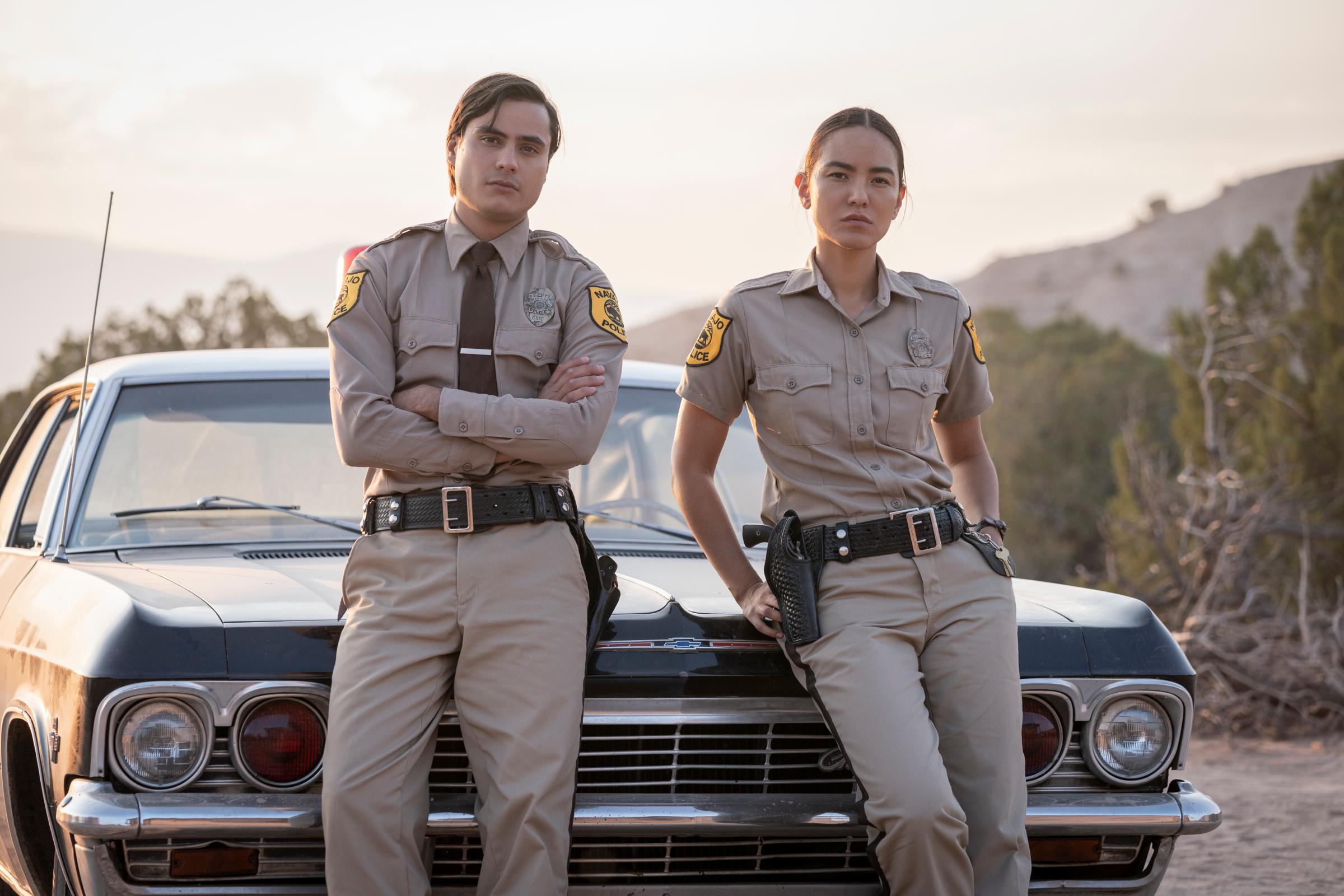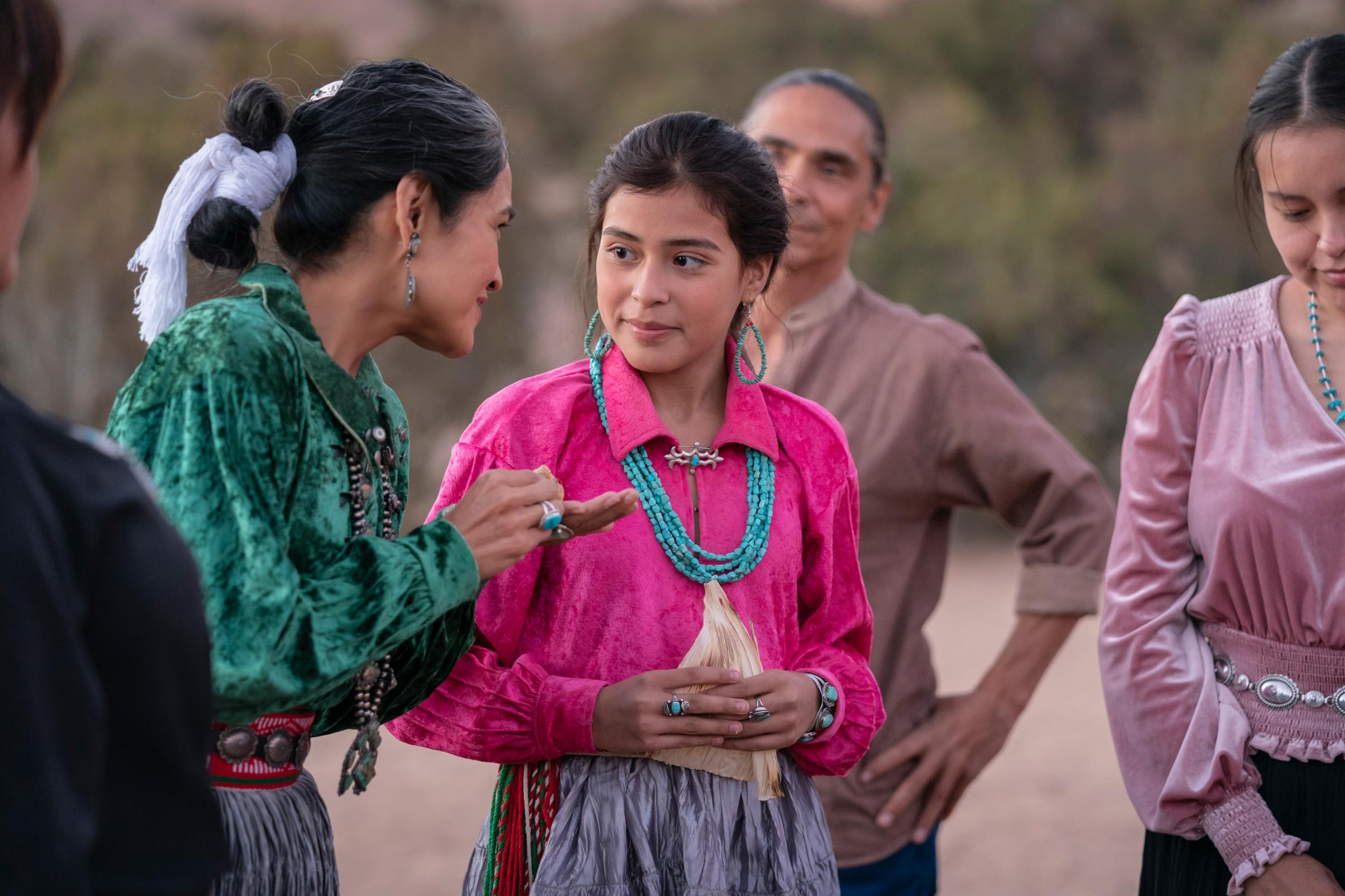Dark Winds, the latest crime drama from AMC, opens with a heist scene worthy of a summer blockbuster. The year is 1971. Two uniformed guards emerge from Gallup Savings & Loans, in the small city of Gallup, New Mexico, lugging padlocked bags stuffed with cash, which they load into an armored van before driving off. Suddenly, a helicopter descends, blocking the road in front of them. One of its occupants hops out and throws a bomb under the van; the explosion lifts the vehicle’s back end into the air like the hind legs of a bucking bronco. A gunfight ensues, the masked bandits make off with the money, and as the helicopter ascends, the generic cityscape gives way to panoramic shots of the golden, butte-studded vistas surrounding Monument Valley.
We won’t find out, right away, where the helicopter ends up. But the journey has taken us to the show’s true setting: the Navajo Nation. This isn’t a common backdrop for the kind of TV epic whose elaborate action sequences run up a tab of $5 million per episode; neither do its overwhelmingly Native American cast and crew fit the profile of the typical storyteller Hollywood sees fit to bless with such a generous budget. Dark Winds, whose six-episode first season premieres June 12 on AMC and AMC+, would be a remarkable crime drama—at a time when unremarkable ones dominate television—even if it wasn’t a groundbreaking showcase for Native talent. The fact that it is gives the show resonance far beyond its overcrowded genre.
While the heist makes for quite a spectacle, it’s a second violent crime, committed weeks later, that consumes the attention of Detective Joe Leaphorn. A Navajo cop played with melancholic decency by the great Zahn McClarnon (recently seen in Reservation Dogs and as Westworld’s haunting Ghost Nation leader Akecheta), he is investigating the motel-room murders of an elderly man and a young woman from the community. The only witness is the woman’s grandmother, a blind healer who is so traumatized by the incident that she can’t even answer questions about it. And it’s clear that the detective has some unpleasant history with her family.

Sign up for More to the Story, TIME’s weekly entertainment newsletter, to get the context you need for the pop culture you love.
Joe is a fascinating hero—an intelligent, college-educated family man whose personal sorrows trickle out little by little, and for whom tribal police work is a way of serving his people. When we meet him, he’s issuing a stern warning to a white man who has attempted to make off with some shards of Native crockery, which Joe is now forcing him to rebury on Navajo soil: “If I catch you stealing artifacts again, the hole you’ll be digging will be a whole lot bigger.” It’s a clever inversion of that absurd old cowboys-and-Indians trope where the white sheriff runs the Native interlopers out of town, as though the latter have no claim on land they’ve occupied for millennia.
Aiding Joe in his investigation is a newly arrived deputy, Jim Chee (Kiowa Gordon), another college boy, who grew up on the reservation but has been gone for so long that he’s received as an outsider. Bernadette Manuelito (Jessica Matten), a shrewd and courageous officer who is practically a part of Joe and his wife Emma’s (Deanna Allison) family, complicates what might otherwise have been the overpowering machismo of an adaptation of Tony Hillerman’s novels about Leaphorn and Chee, without straining believability. The variety of relationships—romantic, competitive, parent-child—that form among these characters, and are tested by their pressurized circumstances, give the show enough emotional depth to sustain multiple seasons.
Equally rich is Dark Winds’ depiction of the Navajo community in the ’70s, where traditional agricultural practices mingled with roadside knickknack sellers catering to tourists and a wave of activist sentiment was on the rise. Executive producer Graham Roland (Jack Ryan), who collaborated with an all-Native writers room, and director Chris Eyre (Smoke Signals) bring an intimate familiarity to the story that it’s hard to imagine would have resulted from a non-Native creative team. Navajo spirituality, and the role it plays in each character’s life, weighs heavily on the plot. Rarely do the creators pause to explain rituals or traditions that might be new to non-Native audiences. But the show is better off without so much exposition; pandering to viewers outside the community would undermine its centering of Navajo characters. And any attentive person will glean the symbolism implicit in, for example, the choice to intercut between one young woman’s joyful menarche ceremony and another young woman’s burial rite.

The heist never drops off the radar, of course. It is the primary preoccupation of Noah Emmerich’s Whitover, a ruthless FBI man who could care less about the two murder victims but needs Navajo law enforcement’s help to search for the helicopter that disappeared over their sovereign land—and for perpetrators he believes are Navajo. “One hand washes the other, kemosabe,” the perennially condescending Fed tells Joe. So the reservation cops allow their homicide investigation to merge with Whitover’s “white people’s problems,” in hopes of cracking both. Because this is a crime show, connections between the two matters inevitably emerge.
Dark Winds isn’t entirely free of other crime-drama clichés. There are the occasional goofy twists and unbelievable coincidences. But for the most part, it’s a well-balanced, exciting mystery that tackles questions of identity, belonging, and how one can best serve their disadvantaged community, pitting radicals against reformers against alleged sellouts. If the answer it arrives at feels a bit safe, at least it, unlike most seasons of True Detective (to name a similarly character-driven detective show) comes to a real conclusion. And though it deals with somber topics, Roland injects plenty of levity into the scripts. (Rainn Wilson has a small yet memorable role as Devoted Dan, a holy-rolling car salesman who’s always exiting an orange, shag-carpeted van with women who aren’t his wife.) Gripping, gorgeously shot and propelled by superb performances, Dark Winds is a very good show that also happens to be very important.
More Must-Reads From TIME
- The 100 Most Influential People of 2024
- Coco Gauff Is Playing for Herself Now
- Scenes From Pro-Palestinian Encampments Across U.S. Universities
- 6 Compliments That Land Every Time
- If You're Dating Right Now , You're Brave: Column
- The AI That Could Heal a Divided Internet
- Fallout Is a Brilliant Model for the Future of Video Game Adaptations
- Want Weekly Recs on What to Watch, Read, and More? Sign Up for Worth Your Time
Contact us at letters@time.com